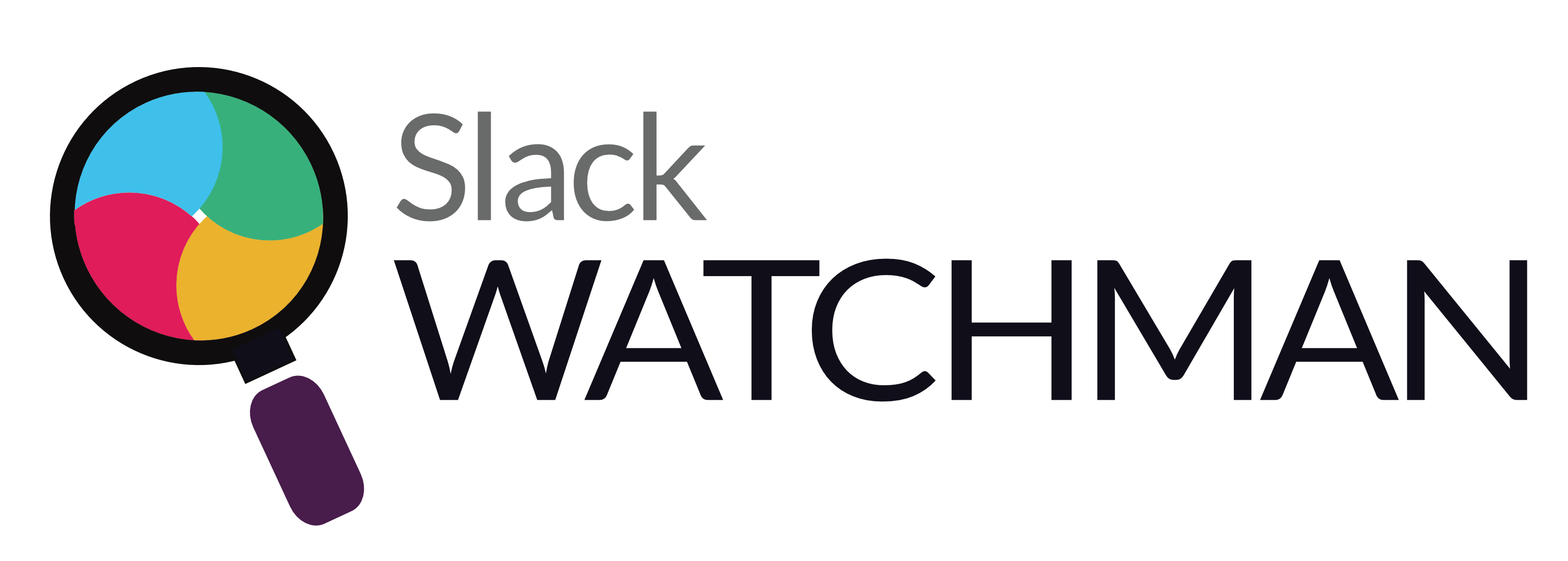Monitoring your Slack workspaces for sensitive information
Project description

Slack Watchman


Monitoring your Slack workspaces for sensitive information
About Slack Watchman
Slack Watchman is an application that uses the Slack API to look for potentially sensitive data exposed in your Slack workspaces.
More information about Slack Watchman can be found on my blog.
Features
Slack Watchman looks for:
- Tokens
- AWS keys
- GCP keys
- Azure keys
- Google API keys
- Slack API keys & webhooks
- Twitter API keys
- Access token
- oauth_token
- oauth_token_secret
- Facebook API Keys
- Access token
- Secret keys
- GitHub keys
- Private keys
- Bearer tokens
- Files
- Certificate files
- Potentially interesting/malicious files (.docm, .xlsm, .zip etc.)
- Personal Data
- Potential leaked passwords
- Passport numbers
- Dates of birth
- Social security numbers
- National insurance numbers
- Drivers licence numbers (UK)
- Individual Taxpayer Identification Number
- Financial data
- Paypal Braintree tokens
- Bank card details
- IBAN numbers
- CUSIP numbers
It also gives the following, which can be used for general auditing:
- User data
- All users
- All admins
- Channel data
- Externally shared channels
- All channels
Any matches get returned in .csv files
Time based searching
You can run Slack Watchman to look for results going back as far as:
- 24 hours
- 7 days
- 30 days
- All time
This means after one deep scan, you can schedule Slack Watchman to run regularly and only return results from your chosen timeframe.
Custom query input
You can enter your own queries to search for to find sensitive data being mentioned in your workspace (e.g. confidential project names).
Pass a .txt file with one search query per line using the --custom command line option. All posts containing custom queries will be returned. Generic terms may return a lot of results over a long timeframe.
Requirements
Slack API token
To run Slack Watchman, you will need a Slack API OAuth access token. You can do this by creating a simple Slack App.
The app needs to have the following User Token Scopes added:
channels:read
files:read
groups:read
im:read
links:read
mpim:read
remote_files:read
search:read
team:read
users:read
users:read.email
Note: User tokens act on behalf of the user who authorises them, so I would suggest you create this app and authorise it using a service account, otherwise the app will have access to your private channels and chats.
Providing token
Slack Watchman will first try to get the the Slack token from the environment variable SLACK_WATCHMAN_TOKEN, if this fails it will load the token from .conf file (see below).
.conf file
This API token needs to be stored in a file named watchman.conf which is stored in your home directory. The file should take the following format:
[auth]
slack_token = xoxp-xxxxxxxxxx-...
Slack Watchman will look for this file at runtime, and notify you if it's not there.
Installation
Install via pip
pip install slack-watchman
Usage
Slack Watchman will be installed as a global command, use as follows:
usage: slack-watchman [-h] --timeframe {d,w,m,a} [--version] [--all] [--users]
[--channels] [--pii] [--financial] [--tokens] [--files]
[--custom CUSTOM]
Monitoring your Slack workspaces for sensitive information
optional arguments:
-h, --help show this help message and exit
--version show program's version number and exit
--all Find everything
--users Find all users, including admins
--channels Find all channels, including external shared channels
--pii Find personal data: Passwords, DOB, passport details,
drivers licence, ITIN, SSN
--financial Find financial data: Card details, PayPal Braintree
tokens, IBAN numbers, CUSIP numbers
--tokens Find tokens: Private keys, AWS, GCP, Google API,
Slack, Slack webhooks, Facebook, Twitter, GitHub
--files Find files: Certificates, interesting/malicious files
--custom CUSTOM Search for user defined custom search queries. Provide
path to .txt file containing one search per line
required arguments:
--timeframe {d,w,m,a}
How far back to search: d = 24 hours w = 7 days, m =
30 days, a = all time
You can run Slack Watchman to look for everything:
slack-watchman --timeframe a --all
Or arguments can be grouped together to search more granularly. This will look for tokens for the last 30 days, as well as queries from the user input file custom.txt:
slack-watchman --timeframe m --tokens --custom ../custom.txt
Project details
Release history Release notifications | RSS feed
Download files
Download the file for your platform. If you're not sure which to choose, learn more about installing packages.
Source Distribution
Built Distribution
Hashes for slack_watchman-2.3.1-py3-none-any.whl
| Algorithm | Hash digest | |
|---|---|---|
| SHA256 | 9206ba38fd11c4ea4bc0cc1092cbdc8268585e4a087a2b30a8267376e7f0f7af |
|
| MD5 | c9bf425c75eb267c892dd4e9a6b9d1d9 |
|
| BLAKE2b-256 | fd37c0ef7b9f81f75e73e0aef249dad618323e343bf5d43561277e1b9c348b15 |












